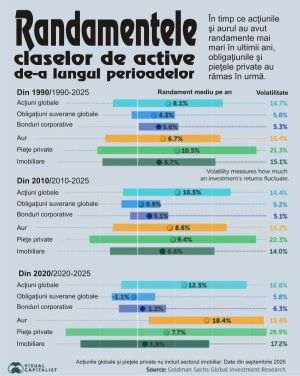• The Leu gained against the Euro
• The Bucharest Stock Exchange had a positive reaction
Exporters and Romanian businessmen do not think that the austerity program, which was passed yesterday, by the Greek parliament, which stipulates drastic measures that would reduce jobs, pensions and jobs, will affect Romania.
Mihai Ionescu, the secretary general of the National Association of Importers and Exporters of Romania (ANEIR), told us that the reduction of the population's consumption in Greece, due to the austerity measures, will result in the lower imports of consumer goods, or, Romania is not an exporter of consumer goods to Greece. Thus, the exports of our country to Greece will not be affected by the austerity measures, he said.
Cristian Pârvan, secretary general of the Association of Romanian Businesspeople (AOAR) thinks that investments will not be affected by the austerity measures.
He said: "Greek businesspeople are interested in tourism, they are traders, not industrialists. The entire Eurozone is in a difficult position. Investments are in question, due to the expected recession across Europe".
• The leu, going up against the Euro
The national currency gained ground against the Euro, as the NBR posted a reference exchange rate of 4.3477 lei, down 0.52 bani compared to the previous session.
The strengthening of the leu comes as, on a foreign level, the European currency yesterday gained against the dolla, from 1.3197 units to 1.3217 units, as the austerity measures in Greece were announced.
The leu also gained against the US dollar yesterday. The Central Bank posted an official exchange rate of 3.2778 lei/dollar, down 0.53 bani, compared to the previous session.
The leu also gained 0.34 bani against the Swiss Franc, as the NBR announced an official exchange rate of 3.5952 lei.
• Fitch: The possibility of a rating raise for "OTE" is low
Concerns over the evolution of the Greek telecommunications sector and of the rating of the Greek telecommunications group "OTE" (the majority shareholder of "Romtelecom"), if Greece were to enter a disorderly default and potentially leave the Eurozone, have increased, a press release of financial ratings firm "Fitch Ratings", says, according to Agerpres.
The possibility of the raising of the "BB" rating of the "OTE" is low, as long as the group maintains its bonds denominated in Euros and "Deutsche Telekom" stands by its policy of supporting "OTE", if it were to need it. "Deutsche Telekom" owns 40% plus one share of the voting rights of OTE.
Still, in the worst case - the hypothetical event of Greece exiting the Eurozone - "Fitch Ratings" estimates that a nationalization of the telecommunications sector or of "OTE" will not take place. Even though it will remain one of the most powerful corporations in Greece, the company will be faced with a huge burden, tied to its bonds denominated in Euros, following the devaluation of its cashflows denominated in drachmas. "OTE" might be forced to raise its prices domestically, and the company would be placed at disadvantage compared to its Greek competitors, "Wind Hellas" and "Vodafone".
About the rating of "OTE", "Fitch Ratings" warns that the group might face a cash shortage if its debt were to be redenominated, which would probably lead to a downward revision of its ratings to the "C" or "D" category.
In 2011, "Fitch Ratings" downgraded the rating of the "OTE" group from "BBB-" to "BB". The agency emphasizes that any evolution which could result in greater official support for "OTE", could have a positive impact on the company's rating. In spite of all this, it rather unlikely that the rating of "OTE" would return to the "investment grade" category (ed. note: recommended for investment), considering the continuous tension Greece's sovereign rating is subjected to.
"Hellenic Telecommunications Organization" (OTE), the largest telecommunications group in South Eastern Europe, owns 54.01% of "Romtelecom". Its mobile telephony division, "Cosmote", is present on the Romanian market through "Cosmote Romania", a company owned by the "OTE" group, through "Romtelecom" (30% of its shares) and "Cosmote Greece" (70% of the shares).
• The Greek government struggles to cut its drug bill
Greece's continuing high level of spending on medicines is a striking example of the broader problems facing the country as it battles under international pressure to cut public expenditure and rein in the nation's debt, "Financial Times" writes, according to Agerpres.
"There were no controls on spending in the past, the whole system favored consumption", said Antonis Karokis, the director for Merck, the US pharmaceutical group, in Greece. "It was not only supplier-led, but demand-led by doctors and patients".
Last year the Greek state and the private healthcare sector spent 4 billion Euros on medicines alone, amounting to 2.4% of the GDP - the highest proportion in any industrialized country and more than twice that in the UK. Greece spends more per capita on drugs than any nation aside from the US and Canada.
The number of drug wholesalers, doctors and pharmacists per capita is among the highest in the OECD group of countries (ed. note: Organization for Economic Co-operation and Development), each with incentives to encourage medicine use.
Corruption remains widespread, according to doctors, pharmacists and medical suppliers, with direct bribing by suppliers.
"The fakellaki system (ed. note: envelopes containing bribe money) is still in use at big hospitals in Athens, run by the heads of procurement," says one Greek executive working for a foreign medical supplier.
Patent-protected drugs have been sold to the Greek health system in high volumes at prices which are relatively low by EU standards. One consequence was more than 850 million Euros last year in "parallel exports" of medicines bought cheaply by Greek pharmacists and resold abroad. The government responded in recent months by banning foreign sales of some medicines after domestic stocks ran out.
Once patents expire, the lack of any requirement for Greek doctors to prescribe cheaper, generic versions means patented drugs still represent nearly 80 per cent of total prescriptions in Greece, compared with less than 30 per cent in Germany. Yet generics were traditionally sold at relatively high prices, with very low discounts to patented drugs. Even after recent reforms, they are typically only a third cheaper, compared with lower rates of nearly 90 per cent in the UK.
Vassili Kontozamanis, a former Greek drug regulator, calls for greater efforts to boost generic prescribing at lower prices, but he cautions that such moves are meeting resistance from the country's powerful generic drug industry, which employs more than 15,000 people.
Recent government reforms have included non-binding prescription guidelines, and cuts in drug prices amounting to 1 billion Euros, with the aim of reducing the state's medicines bill to 1% of the GDP by the end of 2012. But reforms at state hospitals are making only modest progress amid strong opposition from medical staff.
• The depreciation of Greek government bonds - an additional cost for Bank Austria
Bank Austria, the division of Italian bank UniCredit, may see further depreciation of the Greek government bonds which it owns of about 100 million Euros, but will post a profit in 2011, Willibald Cernko, the general manager of the Austrian bank said yesterday, quoted by Reuters, according to Agerpres.
In an interview with "Wirtschaftsblatt", Willibald Cernko said: "We have already written down 60%. We will in total write down 80%, that means that we will write down about another 100 million Euros".
After booking the Greek government bonds at their market value, the downward trend of the market may change in this year's first quarter, the head of the Austrian bank explained.
Discussing the impact of the Hungarian law (a country where Bank Austria is active), which allows the repayment at a preferential rate of the loans taken out in foreign currencies, in particular in Swiss Francs, Willibald Cernko said that the bank he leads was not as affected as other lenders: "We are not that exposed to this area, we were cautious and we set aside about 60 million Euros. But we are still among the most profitable banks in Hungary".
He also said that he expects 2012 to be positive and said that the bank wouldn't be needing any state aid.
In Romania, UniCredit is present through UniCredit Ţiriac Bank.
• Greece, forced to convince Europe
• The Brussels authorities want a written agreement from the Greek officials
The Greek government is currently being pressured, meaning that it has to convince the skeptical European leaders that it won't stray from the implementation of the harsh austerity plan which the Parliament in Athens approved on Sunday.
The Greek parliament has voted in favor of new massive wage, pension and job cuts in the public sector, included in a savings package of 325 million Euros (out of the total of 3.3 billion Euros expected for 2012). These measures are needed for the EU and the IMF to release the second bailout package of 130 billion Euros.
The austerity program was passed by 199 Greek deputies of the 278 present. It bears mentioning that 20 out of the 153 socialist deputies voted against the project, and were immediately excluded from the parliamentary group of the Pasok, according to the decision of the party's leader, Giorgios Papandreou. Also, 21 right-wing deputies, out of a total of 83, voted against the plan, and were also excluded from Parliament.
The program passed on February 12th, also contains a new privatization and structural reform schedule, and by Wednesday, the Greek officials need to provide details on all the austerity measures included in the package.
The approval of the austerity package came at a time when 100,000 protesters are fighting the police in the streets of Athens, protesting the decision of the Parliament. Under the circumstances, the representatives of the Greek government have announced that the country's political leaders have until Wednesday to provide the European Commission with a written commitment to implement the austerity measures.
The cuts of the Greek budget for 2012 include:
- the reduction of public spending on drugs, by at least 1.076 billion Euros and the cutting of the overtime pay for doctors, which would generate savings of at least 50 million Euros;
- the cutting of 300 million Euros in military spending;
- the elimination of about 500 positions of mayors, deputies and employees in the local administration, in order to save 30 million Euros;
- cutting central government expenses for the elections by at least 270 million Euros;
- cutting the public investment budget by 400 million Euros;
- cutting pensions;
- a 10% cut in the special wages of the public sector, which are not included in the new compensation grid;
- the reduction of the minimum wage by 22%;
- the elimination of automatic wage raises, as well as seniority bonuses;
- the placing of 15,000 public sector employees into technical unemployment, which will be paid 60% of their base salary, and will subsequently be laid off.
When it comes to privatizations, in Q1 2012 Greece is required to sell stakes in gas company Depa, water company Eydap-Eyath, oil company Hellenic Petroleum and betting group Opap. By the end of 2012, the Greek state is expected to earn 4.5 billion Euros from privatizations. (A.V.)
•
Wolfgang Schaeuble, German finance minister: "Greece will be bailed out, one way or another, if it is going to meet its obligations".
•
The Eurozone Finance ministers will meet on February 15th, to decide on the second Greek bailout package.
•
The early parliamentary elections in Greece will take place in April, according to govern spokesman Pantelis Kapsis. "This government has one to one-and-a-half months left. The elections will take place in April", Kapsis said.
•
• Brokers: Greece's austerity program had a positive effect on stocks
Most brokers feel that the Bucharest Stock Exchange (BSE), felt the positive effects of the adoption of the economic austerity program by the Greek Parliament. Still, some of them consider that yesterday's gains are due to the favorable domestic context.
The BET index ended yesterday's session up 0.93%, to 5,096 points, whereas the BET-FI rose 2.35%
• Mihai Mureşian, "Intercapital Invest": Investors interest is more the result of the domestic factors
Mihai Mureşian, trading director at "Intercapital Invest", considers that, at the moment, the local market will not react in any way to the measures adopted by the Greek government.
He said that both lately and at the current moment, the shareholders' high interest in the shares listed on the BSE are more the result of domestic factors, and in particular of those which concern the economic operation of companies last year, and less of what is happening abroad.
Mihai Mureşian considers that due to the reasons mentioned above, there is a decorrelation between the evolution of the local market and the international markets which may persist at least until summer.
"Obviously, if Greece's problems escalate, or the worries over Europe's macroeconomic situation deepen, this will strongly affect the international stock markets, we can expect the domestic market to respond in a similar manner to the moves of the global financial markets".
• Marcel Murgoci, "Estinvest": Gains for the most important companies listed on the Bucharest Stock Exchange
Marcel Murgoci, operations manager of "Estinvest" Focşani considers that the passing by the Greek parliament of the austerity plan needed for a new tranche of the loan has led to gains for the most important companies listed on the BSE. "The decision of the finance ministers in the Eurozone is being awaited (who will meet on February 15th) concerning the bailout which will be awarded to Greece", he said. "The financial markets are closely watching the situation in Greece, and there is a certain tension among investors, which is caused by what will happen to Greece after it gets the loan: will it need another? Will the social tension put pressure on the government?"
• Simion Tihon, "Prime Transaction": "The legislative austerity project had a positive effect on the markets".
Simion Tihon, broker "Prime Transaction", told us that Friday's trading session as well as that of yesterday prove that there is a certain correlation between the domestic stock exchange and the international markets.
"Whereas on Friday, the pessimism generated by the delay of the agreement for a new rescue package for Greece has depressed the financial markets, which was also felt in Bucharest, today (ed. note: yesterday), the approval by the Greek parliament of the austerity legislative draft had a positive effect on the markets", said Simion Tihon.
He said that as long the events in Greece will keep pressure on the international financial markets, investors on the Romanian market will continue to react accordingly.
• Andrei Rădulescu: "Companies in the Romanian financial sector were the ones who benefited the most from the decision of the Greek parliament"
Andrei Rădulescu, analyst at "SSIF Broker" told us that in Romania, financial companies were the ones who had the most to gain from the decision of the Greek parliament, as the BET-FI index tested the 25,000 points threshold: "Basically, these companies are the most liquid, as well as those that can pay out significant dividends for the 2011 fiscal year".
Andrei Rădulescu considers that the decisions of the Greek parliament had a positive effect on the mood of the European stock markets: "Basically, Greeks had to pass this kind of measures in order to get the new financial support program of 130 billion Euros". He said that for the most part, this vote had already been priced in, given the fact that the stock market indexes of the main European markets rose less than 1%.
Mr. Andrei Rădulescu considers that, in the short term, the climate remains predominantly positive, since at the end of February a new auction of the European Central Bank is scheduled to take place, involving European banks.
However, he considers that in order for the stock markets to grow in a sustainable manner, investments in the real economy need to be relaunched and at the moment there are no conclusive signs in this regard. (Crăiţa Simionescu)




































